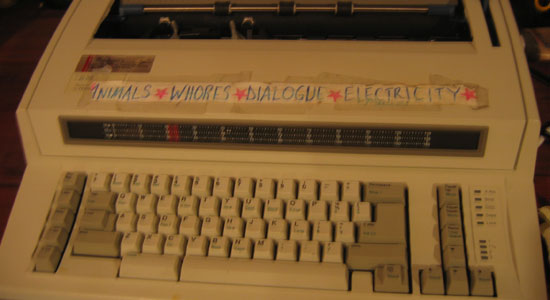 Even if you don’t know Don Fleming by name, chances are you own a ton of records he’s helped make. As a producer, he’s collaborated with the likes of Sonic Youth, Dinosaur Jr, Teenage Fanclub, Screaming Trees, the Posies and Hole, to name just a handful. He works for the Alan Lomax Archive and has done archival work for the estates of Hunter S. Thompson, Ken Kesey and others. He’s fronted such groups as the Velvet Monkeys, B.A.L.L. and Gumball and was a member of the band that provided the music to 1994 Beatles biopic Backbeat. Fleming also runs the Instant Mayhem label, which recently reissued the Velvet Monkeys’ 1982 debut Everything Is Right and is about to release the solo Don Fleming 4, which features Kim Gordon, Julie Cafritz and R. Stevie Moore. If all that weren’t enough, Fleming is guest editing magnetmagazine.com all week. Read our brand new Q&A with him.
Even if you don’t know Don Fleming by name, chances are you own a ton of records he’s helped make. As a producer, he’s collaborated with the likes of Sonic Youth, Dinosaur Jr, Teenage Fanclub, Screaming Trees, the Posies and Hole, to name just a handful. He works for the Alan Lomax Archive and has done archival work for the estates of Hunter S. Thompson, Ken Kesey and others. He’s fronted such groups as the Velvet Monkeys, B.A.L.L. and Gumball and was a member of the band that provided the music to 1994 Beatles biopic Backbeat. Fleming also runs the Instant Mayhem label, which recently reissued the Velvet Monkeys’ 1982 debut Everything Is Right and is about to release the solo Don Fleming 4, which features Kim Gordon, Julie Cafritz and R. Stevie Moore. If all that weren’t enough, Fleming is guest editing magnetmagazine.com all week. Read our brand new Q&A with him.

Fleming: Hunter S. Thompson has always been one of my favorite writers. In late 2005, I was asked to join the team making the film Gonzo: The Life And Work Of Dr. Hunter S. Thompson. Items from his personal archive—photos, films, videos, letters, audiotapes and manuscripts—were to be used in the film. None of the material had yet been copied, and the cataloging was minimal, so I was brought in to handle the archival issues. Over the next year or so I transferred hundreds of cassette tapes that Thompson had made in the course of his work. Outstanding segments were used in the film, and I was able to put together a five-CD boxed set, The Gonzo Tapes: The Life And Work Of Dr. Hunter S. Thompson, to coincide with the film’s release. The audio boxed set concentrates on the same time period as the film, 1964 to 1975, and includes Thompson’s work tapes for two of his biggest triumphs, Hell’s Angels and Fear And Loathing In Las Vegas. Many nuggets are uncovered on the tapes: Acosta describing a participant of the D.A. conference, and not himself, as a “Samoan” and the actual, tangible limits of their drug stash. The tapes reveal the original time that “One Toke Over The Line” was blasted on the radio as they drove through Las Vegas looking for the American Dream, which eventually was recreated in the Hollywood version with Johnny Depp and Benicio Del Toro croaking out the song under the desert sun. The tapes show that Thompson took the elements of their real escapade and twisted them into his own hallucinatory narrative.
Video after the jump.
—photo of Hunter S. Thompson’s typewriter, Woody Creek, Colo., 2006, by Don Fleming






